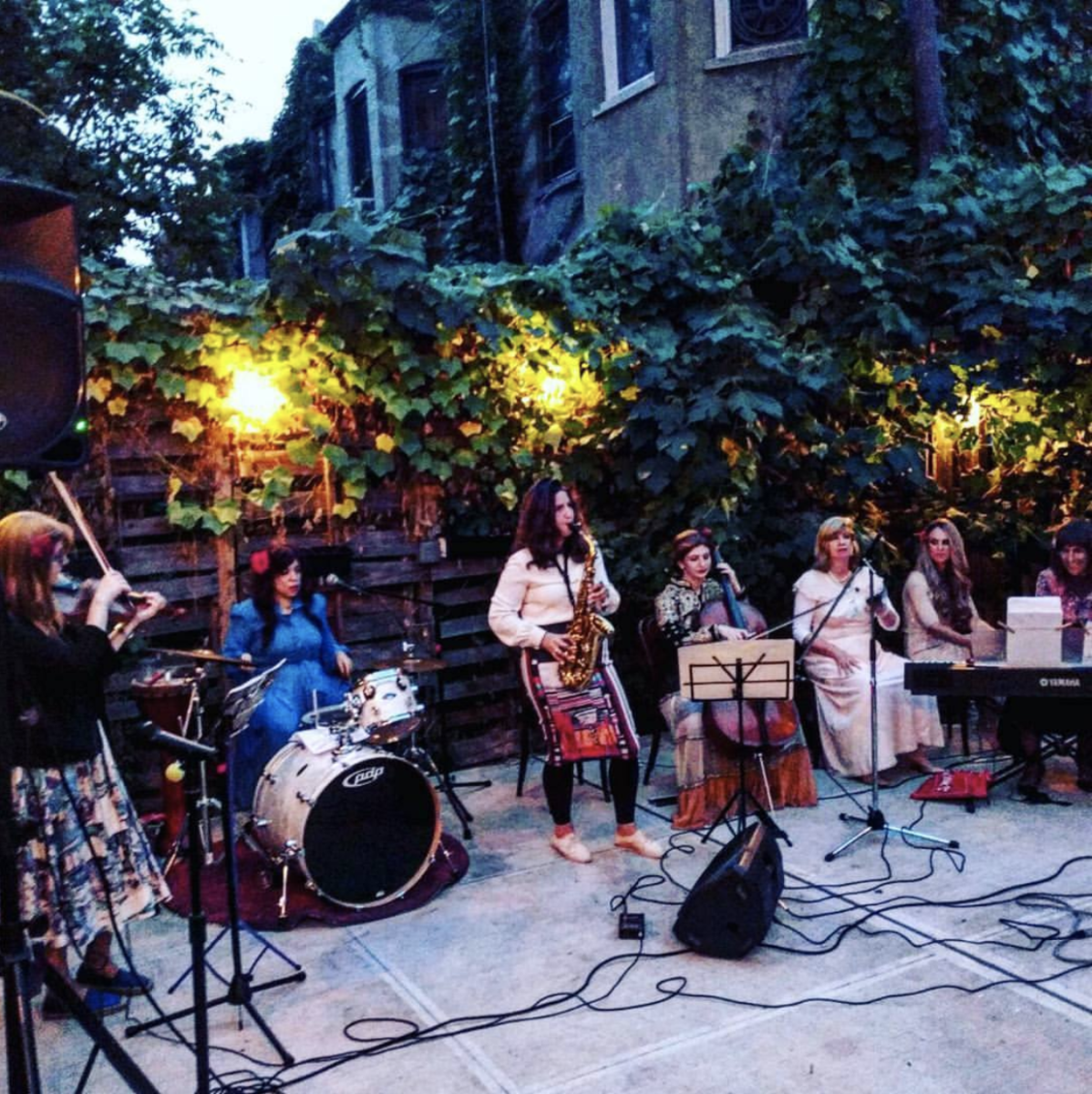The seven members of the New Moon All Stars Party Band, a group based in Crown Heights, have some serious musical chops. The pianist has played with and composed scores for major contemporary dance companies. The percussionist is the former drummer and backing vocalist for ‘90s psychedelic rock band Hopewell. The cellist has a Master’s degree in cello performance and has performed at Carnegie Hall. Their influences are as varied as their musical backgrounds, with a repertoire that includes Brazilian bossa nova, jazz and Motown classics.
But it’s not for everyone.
Men aren’t allowed to watch them perform, and the reason has a lot to do with what makes these musicians unique. The band consists entirely of Hasidic Orthodox Jewish women who, in accordance with the Orthodox principle of kol isha, perform for female audiences only. Kol isha prohibits men from hearing a woman’s singing voice as it may lead to impure thoughts. The band’s cellist, Laura Melnicoff, 27, explains: “It’s not, strictly speaking, the woman’s problem, but out of consideration, the woman will hold back from singing if a man is in front of her.” The only video of the band does not feature vocals so that it can be easily disseminated without inviting censure from the Hasidic Orthodox community.
The fact that they won’t play in front of male audiences is hardly the only thing that makes the band special. Their eclectic repertoire and influences makes their sound almost unclassifiable. The New Moon All Stars Party Band is also multigenerational, which you don’t often see. The eldest member of the group, Mirele Rosenberger, 70, is a grandmother and mother of eight, while Chaya Sara Weiss, the youngest member of the band, is in her early twenties and single. Dalia Shusterman, the percussionist, 42, says that this diversity enables the band to run the “whole gamut of feminine experience.”
With the exception of Weiss, the members of the New Moon All Stars Party Band, all settled in Crown Heights because it is the global epicenter of the Hasidic, Orthodox Chabad-Lubavitch (‘Chabad’) movement — whose World Headquarters is located on 770 Eastern Parkway. Most of the band were musically trained and became Chabad later in life. Each woman’s journey to Orthodoxy was different. For example, Rosenberger slowly became devout years after her husband became religious. In contrast, Melnicoff started practicing Judaism in college with a friend who, like her, had Jewish heritage but was raised in a secular home. The band eventually formed in this corner of Brooklyn after the musicians met and connected while playing at birthdays, in smaller all-female bands, and at an annual Chabad emissary convention.
Once the band members assemble, they work through a cosmopolitan, upbeat set list including songs in Portuguese, Hebrew, English and French. The women improvise and play with a quiet confidence that only comes with having mastered one’s art form. Shusterman says that had the band members been born and raised in the Crown Heights community, they “probably wouldn’t have a reference” for such a wide range of music.
Many Chabad people will only listen to music written by Jewish artists, and there are people within the community who would refuse to watch the band live because they cover music written or performed by non-Jewish artists. In fact, Shusterman says she generally plays only Jewish music for her children. However, she says performing this music in all women settings is permissible because of their intention: to bring “joy to women.”
According to Melnicoff, the band’s main aim is to give Orthodox women an opportunity to have fun and let loose. Another tenet of modesty in their religion is that women cannot dance in front of men. So, the band actively provides an outlet to empower their audience to “really express themselves by dancing and singing along,” she says. Rivka, Rosenberger’s daughter, said that the band’s last live performance was “really amazing.” She’s an avid dancer and performed a belly dance at the finale of their last live show.
At the rehearsal in Rosenberger’s home, the band workshops a new song, ‘Cuando el Rey Nimrod,’ for Rivka to dance to. Shusterman starts a rhythmic drum beat for the Sephardic song and Rivka smiles, extends her arms and begins to move her hips. As the tempo increases and the cello, violin and piano begin, she starts to twirl. Gittel, the pregnant makeup artist who, after finishing up with her satisfied client, had been sitting on a couch eating a mango salad, gets up and sways towards Rivka. As the sisters gleefully mirror each other, belly dancing to the Middle Eastern tune, there is a sense of the uninhibited release the audience must feel at their performances. Their next gig is in October — a must-see. All are welcome, only if you’re female.


Leave a Reply